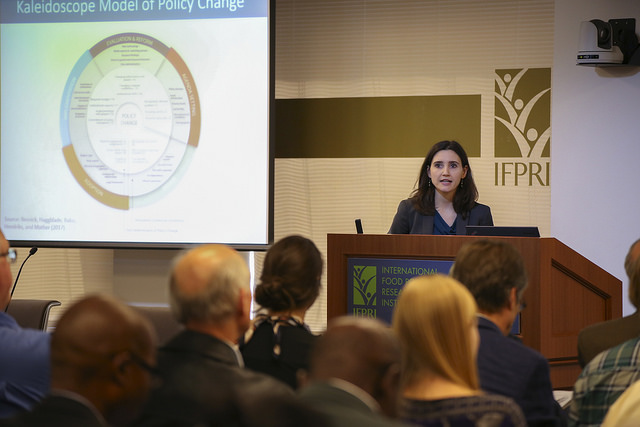What drives policy change? IFPRI, Michigan State University (MSU), and the University of Pretoria, South Africa—partners in the Food Security Policy Innovation Lab—developed the Kaleidoscope Model to answer that question. The model examines how food policies evolve as they respond to a results-based agenda in which researchers and practitioners are judged by their progress towards meeting specific targets, objectives, and goals.
“To actually achieve policy impact, you need to have a broad and holistic understanding of the underlying policy process,” IFPRI Senior Research Fellow Danielle Resnick said at a recent seminar that looked at the Kaleidoscope Model’s genesis and applications.
The model was developed using diverse evidence from the field to arrive at some general principles, Resnick said. This began with a literature review on political economy, public administration, and policy processes. Developers also looked at actual case studies on what drove policy reform and found that, regardless of the policy domain, they shared a set of consistently important factors. Those became the sixteen proximate variables that are the basis for the model.
The model’s design is well-conceived and clarifies what could be a confusing issue due to its complexity, said David Pelletier, a professor of nutrition policy at Cornell University.
Steven Haggblade, a professor of international development at MSU, discussed six case studies in which the model’s hypotheses were tested and discussed, seeking ways to identify opportunities for engaging in successful policy dialogue. “Getting reforms on the agenda is the hardest step,” said Haggblade, but “once on the agenda, reforms are usually successful.” Taking the audience through several examples, he concluded that policy reform is most feasible with the presence of credible evidence, advocates, financial support, and institutional reform.
“The big benefit of the model is that the process is organized in a very logical way … It provides a way to go through a checklist that makes it a much clearer framework,” said Michael Morris, lead agricultural economist at the World Bank, who discussed the model from a practitioner’s perspective. However, he said, the predictive value of the model could be limited by components that emphasize veto players and persuasive advocates over others and suggested that the model would be more robust if all the variables are treated as equally important.
Efforts to understand the drivers of policy change are important because “we are really far behind on delivering what is needed for improving the nutrition of people,” said Sheryl Hendriks, a professor and director of the Institute for Food, Nutrition, and Well-being at the University of Pretoria. She described the Kaleidoscope Model’s utility in identifying drivers and constraints on policy change by synthesizing cases conducted in Malawi, South Africa, and Zambia on micronutrient interventions, including vitamin A and iron fortification and iodine supplementation. The results demonstrated the role of national leadership as one common driver in evolving policy responses, she said, while the level of stakeholder engagement varied significantly across the three countries.
Katarlah Taylor is an Information and Knowledge Management Facilitator at IFPRI.







